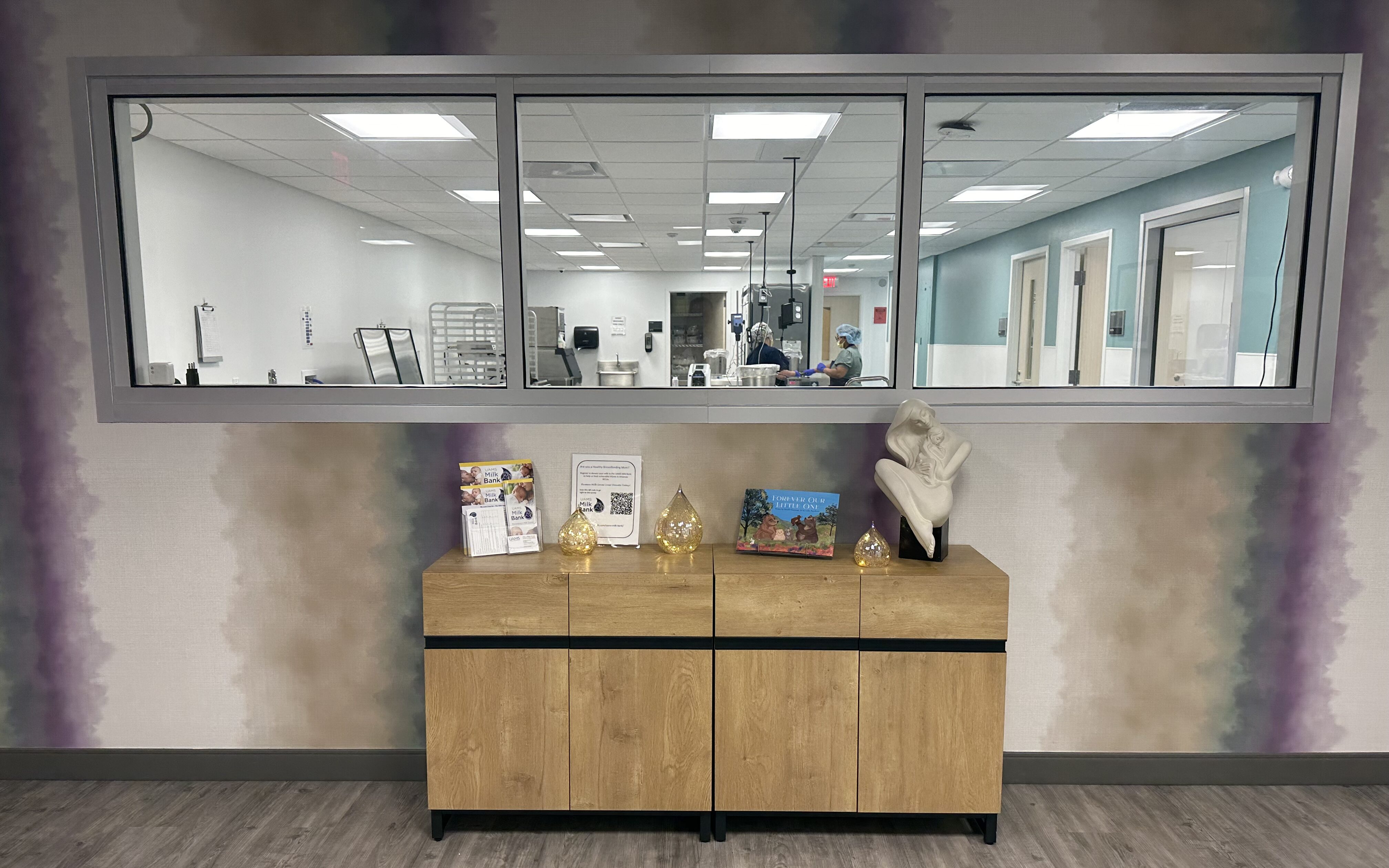
Safety Is Our Highest Priority
We ensure that donated milk processed in our facility is safe to feed to our newborns. Many safety measures are in place to protect the quality and integrity of every bottle processed, including pasteurization, nutritional analysis, and third-party microbiological testing.
We abide by and exceed compliance measures set by the Human Milk Banking Association of North America (HMBANA), which were developed according to the Centers for Disease Control and Prevention, U.S. Food and Drug Administration, and World Health Organization standards.
The following flow chart details the continuity of safety measures from screening donors to dispensing pasteurized bottles of donor human milk:
- 100% compliance with Human Milk Banking Association of North America guidelines
- Continuous off-site temperature monitoring systems and preventive controls
- FDA-certified pest management
- Secure, HIPAA compliant data storage
- Medical database and barcoding system
- Macronutrient reference testing using FDA certified Human Milk Analyzer
- Staff training and certification in Current Good Manufacturing Practices and food safety practices
- Onsite Preventative Controls Qualified Individual
- Routine equipment validation and calibration
- Serological and microbiological testing performed at laboratories certified by the Clinical Laboratory Improvement Amendments or ISO
Pasteurization
The UAMS Milk Bank follows strict screening, processing, and dispensing guidelines established by the Human Milk Banking Association of North America to ensure the safety of pasteurized donor human milk.
These guidelines have been established with the advisement of the Centers for Disease Control, the Food and Drug Administration, and the blood and tissue industries. Potential donors provide complete medical and lifestyle histories and undergo blood tests similar to the screening process used at blood banks.
Donated milk is pasteurized to kill any bacteria or viruses. Before the pasteurized milk is dispensed, bacteriological testing is done by an independent lab to ensure its safety.
Milk Donors are rigorously screened, healthy lactating mothers who have delivered a baby within the last 24 months.
- Thawing — Donated frozen milk is thawed under controlled conditions. Once the milk is partially thawed to a slush stage it is poured into containers for thorough mixing before individual testing.
- Macronutrient testing — Individual donor milk is pooled and tested for nutritional content to ensure that the pooled specimens will have the desired total macronutrient contents needed for growth of the recipient infant.
- Pooling — 3-5 individual donor’s milk are pooled into one large sample under guidance of the Medical Director to achieve a set desired macronutrient content.
- Bottling and Sealing — Milk is precisely dispensed into bottles which are then capped and sealed using an automated sealing system to ensure the milk inside is safe through the pasteurization, freezing and shipping process until it is unsealed and opened by the receiving neonatal intensive care unit.
- Pasteurization — The sealed bottles are labeled with a barcoded thermal resistant label and pasteurized in one of two pasteurization units. This is a state-of-the-art pasteurizing and rapid cooling unit developed by Kentec Medical. These shaking water baths keep our sealed bottles at precise temperatures for 30 minutes after which they are placed in ice water baths to rapidly cool them to 4 degrees. The cooled bottles are then placed in frozen quarantine until cleared for distribution.
- Microbacterial testing — One bottle from every pooled batch is sent for outside microbacterial testing to ensure every bottle fed to a vulnerable infant is safe from contamination. A batch of pooled milk is not cleared for shipping to a neonatal intensive care unit until the microbacterial culture is negative. Any batch with a positive culture is retested and if it remains positive the entire batch is discarded using safety protocols.
- Macronutrient testing — One bottle from each pooled batch of donor milk is tested for macronutrient content to ensure that the delivered product meets the infant’s nutritional needs.



Helping Women Meet their Lactation Goals
Being successful in meeting your breastfeeding goal, be it a month or a year or more, requires lots of support. Moms need prenatal support, education and planning to be ready to breastfeed their newborn. Families need to prepare to help mom be successful once she is home with her baby. Medical teams need to be prepared to offer support and help throughout the pregnancy and early part of the infant’s life to give mom and baby their best chance at a healthy beginning.
In the future we hope we have a team that can have telemedicine visits with families through their hospitals and clinics around the state, and eventually even at home! We plan to host mobile lactation clinics in the future in areas near those who need support. Through these local visits, we will train medical providers in the community in breastfeeding support and help develop community-level support for breastfeeding mothers, such as breastfeeding cafés where mothers can come make connections with other breastfeeding women and find support and community in their own town.
